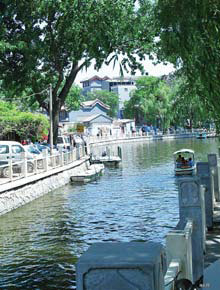Beijing's lakeside paradise
Updated: 2011-08-21 07:57
By Xie Jun and Luo Weiteng(China Daily)
|
|||||||
|
The tranquil shores of Houhai on a languid summer afternoon. Provided to China Daily |
Houhai is a chain of lakes in the middle of Beijing, three blue jewels gleaming in the summer heat. Houhai (the Rear Lake) is actually the name of one lake - the other two being Qianhai and Xihai - but the name has come to be used for all three as well as the surrounding area.
To go to the entrance of Houhai, the access is through the famous Yandai Xiejie, a hutong dating back to the Ming Dynasty (1368-1644). There used to be shops selling smoking paraphernalia such as tobacco, cob pipes and water pipes. These days, the lane is lined with shops selling tourist handicrafts, knick-knack shops, funky restaurants and coffee shops.
At 2 pm, the heat as well as the number of tourists had reached a peak, and we decide to find a shady place to recuperate from the long journey here.
We found a bar right beside Silver Ingot Bridge (Yinding Qiao), with a really nice view from its second-floor balcony. We got ourselves a comfortable seat and ordered drinks.
We saw people come and go through Yinding Qiao, taking pictures, talking, listening, laughing and enjoying. It's Qixi, the Chinese Valentine's Day, so most of the visitors were pairs of young of lovers who stopped and bought flowers from opportunistic vendors who had materialized with bouquets and bunches of roses.
As we strolled along the eastern shore of the lake, we came across old timers sitting in the shade of willow trees and trying their luck with fishing rods while swimmers splashed around in the water.
There were more bars and restaurants along the road, with their own themes of decor, food and drink. Many feature lakeside settings.
Beside the lake, elegant imperial-era mansions (some still home to China's elite, others now converted to museums) offer an intriguing glimpse into the lives of the ruling Qing nobles.
Former residents include Zaifeng, Prince Chun, who was the father of Puyi, China's last emperor. The prince's mansion and gardens later became the residence of Soong Ching Ling, the widow of Sun Yat-sen and China's revolutionary role model.
Another royal who once lived by these shores was Yixin, Prince Gong, who governed in the 1860s and 1870s. He is remembered for advocating strong ties with Westerners, as well as for his attempts to modernize China. Prince Gong's Mansion is known as one of the most ornate and extravagant resident compounds in all of Beijing. It is also now open to the public.
Revolutionary author Guo Moruo is yet another former famous resident and his home, too, now serves as a museum.
People say the best time to know Houhai is after 10 pm, so we decided to wait for night to fall.
As darkness came, the place got busy again and buzzed with activity as people arrived for a relaxing drink and dinner in the bars, cafes and restaurants.
It was a contrast from the languid tapestry of the afternoon. With Beijing skyscrapers springing up like mushrooms after rain, Houhai can take you breath away and free your heart as a peaceful retreat.
You can contact the writers at sundayed@chinadaily.com.cn.
For China Daily
(China Daily 08/21/2011 page16)
